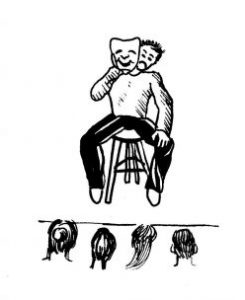By Grace George ’17
On stage, comedians appear to be the happiest people with senses of humor that run deep. They love to make people laugh so, naturally, it would be assumed that they love to laugh as well. But research, and confessions from comedians themselves, have proven otherwise.
While the suicide of beloved actor and comedian Robin Williams only brought this issue to the public eye in 2014, it had been going on for years prior to that.
Famous comedians such as Woody Allen, Louis C.K., Wayne Brady and Ellen DeGeneres have all admitted to experiencing depression either currently or in the past. While it may be hard to understand how our favorite comedians struggle with depression, the answer as to why is simple: Comedy is a form of escape for those who are depressed. It can be relaxing—and distracting—and take away from the seriousness of life’s problems.

In 2011, Alex Lickerman, M.D., posted an article on Psychology Today where he said, “If we can joke about a traumatic event, we’ll often find ourselves feeling that what’s happened to us isn’t so bad and that we’ll be able to get through it.”
Even some West Essex students are aware of this generally underground problem.
“It is a weapon against sadness and grief,” said senior Amanda Margiolas, who wrote a research paper on comedians dealing with depression in her AP Language and Composition class. “When something goes wrong, it is essential to think about the positive and move on.”
Comedy, for some people, is a coping mechanism. It helps with pain or loss and provides comfort when we feel alone, but sometimes laughter is not the best medicine.
While comedians who mask their depression with humor may appear stoic, they are only hurting themselves. Those who hide their issues instead of confronting them allow their problems to grow without recognition.
Comedians have the tendency to allow themselves to have higher hopes which helps in the short term, but in the long term it can be destructive. “High hopes can lead to even higher levels of disappointment,” Margiolas said. “By constantly believing everything is alright, no issue is ever being addressed or solved.”
Since depression is such a heavy topic, most people are not open to talking about it. As a result, they will hide their depression as if it were a flaw to be ashamed of. “The social laugh does not necessarily mean that one is feeling either amusement or pleasure,” John Bailey said in his novel, “The Intent of Laughter.” “It is merely a sign of self-assurance. It is a signal that one is successful and not depressed.
While this isn’t an issue that can be resolved, it is important for people to realize that jokes sometimes have deeper meanings and the people who are trying their best to make others smile, can have trouble getting themselves to do the same.
Next time your friend cracks a joke or your favorite comedian makes you laugh, consider what his or her laughter might be masking.



